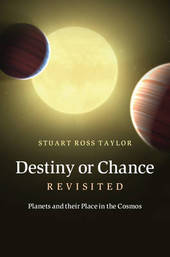
|
Destiny or Chance Revisited: Planets and their Place in the Cosmos
Hardback
Main Details
| Title |
Destiny or Chance Revisited: Planets and their Place in the Cosmos
|
| Authors and Contributors |
By (author) Stuart Ross Taylor
|
| Physical Properties |
| Format:Hardback | | Pages:313 | | Dimensions(mm): Height 234,Width 159 |
|
| Category/Genre | Cosmology and the universe |
|---|
| ISBN/Barcode |
9781107016750
|
| Classifications | Dewey:523.1 |
|---|
| Audience | | General | | Tertiary Education (US: College) | |
|---|
| Illustrations |
9 Plates, color; 9 Halftones, unspecified; 3 Line drawings, unspecified
|
|
Publishing Details |
| Publisher |
Cambridge University Press
|
| Imprint |
Cambridge University Press
|
| Publication Date |
27 September 2012 |
| Publication Country |
United Kingdom
|
Description
This exciting tour of our Universe explores our current knowledge of exoplanets and the search for another Earth-like planet. Beginning with the basic concepts of planet formation and the composition of the Universe, Stuart Ross Taylor summarises our knowledge of exoplanets, how they compare with our planets and why some stars have better habitable zones. Further sections provide a detailed study of our Solar System, as a basis for understanding exoplanetary systems, and a detailed study of the Earth as our only current example of a habitable planet. The book concludes with a philosophical and historical discussion of topics surrounding planets and the development of life, including why our chances of finding aliens on exoplanets is very low. This is an engaging and informative read for anyone interested in planetary formation and the exploration of our Universe.
Author Biography
Stuart Ross Taylor is a trace element geologist and an Emeritus Professor at the Australian National University. His research has covered wide-ranging topics involving trace element geochemistry, from the composition and evolution of the Moon, to tektites and the continental crust of the Earth. He has a DSc from the University of Oxford, is a Foreign Member of the US National Academy of Sciences and has received the Goldschmidt Medal of the Geochemical Society, the Leonard Medal of the Meteoritical Society and the Bucher Medal of the American Geophysical Union. Professor Taylor is the author of 240 scientific papers and nine books, including Planetary Crusts (with Scott McLennan, 2008) which won the 2010 Mary Ansari Best Reference Award of the Geoscience Information Society. He carried out the initial analysis of the first lunar sample returned to Earth at NASA, Houston in 1969 and Asteroid 5670 is named Rosstaylor in his honour.
Reviews'This book is an encyclopaedic reference of the vast range of intertwining phenomena and processes which compete to shape the paths of planet-making. It is comprehensive, thorough, and admirably up-to-date. With many intriguing historic antidotes and vivid analogies, Taylor lucidly conveys some deep concepts in layman terms, without the distraction of intimidating formula or excessive jargon. It is a must-have for all amateurs or professionals who are fascinated by our place in the Universe.' Douglas Lin, Lick Observatory, University of California 'In his highly readable style, Ross Taylor describes the most recently discovered members of the solar system family, and the planets found to circle other stars. Anyone interested in planetary formation will be interested by his argument for their formation by chance and the laws of physics, not by destiny or design, and his conclusion that other peopled earths must be extremely rare.' John Wood, former Associate Director, Harvard-Smithsonian Center for Astrophysics 'This book presents an interesting and novel view of the origin of the Earth and life upon it. It successfully covers the known fact[s] about the main members of our solar system as well as fully covering the recent discoveries concerning other planetary system[s]. It also looks the formation of planets and planetary system[s], placing the concept within the wider context of stars and galaxies. It is [a] thoroughly readable account, accessible to a wide audience, with complex concepts being explained in an informative way. Readers of all levels will both enjoy and learn from this book.' Iwan Williams, Queen Mary, University of London 'Subject: nothing less important than the universe including its history. Author: nothing less than a world-renowned scientist of broad learning with an exceptional gift for exposition. Result: nothing less than a must-read for scientists, philosophers, and anyone interested in learning about some of the most dramatic advances in our understanding of the universe and our place in it.' Michael J. Crowe, Professor Emeritus, University of Notre Dame, and author of The Extraterrestrial Life Debate, 1750-1900 'This is an engaging and informative read for anyone interested in planetary formation and the exploration of the universe.' Lunar and Planetary Information Bulletin '... benefits from an accessible and engaging tone ... full of interesting tidbits ...' Olivia Johnson, skyatnightmagazine.com 'Without doubt one of the most important astronomical texts of the decade so far.' Astronomy Now 'Taylor puts the reader at ease early by defining terminology in an inviting conversational tone, which continues throughout the book ... Useful for intrepid laypersons, students, and professionals. Summing up: recommended. Lower-division undergraduates and above; general audiences.' N. W. Hinman, Choice
|